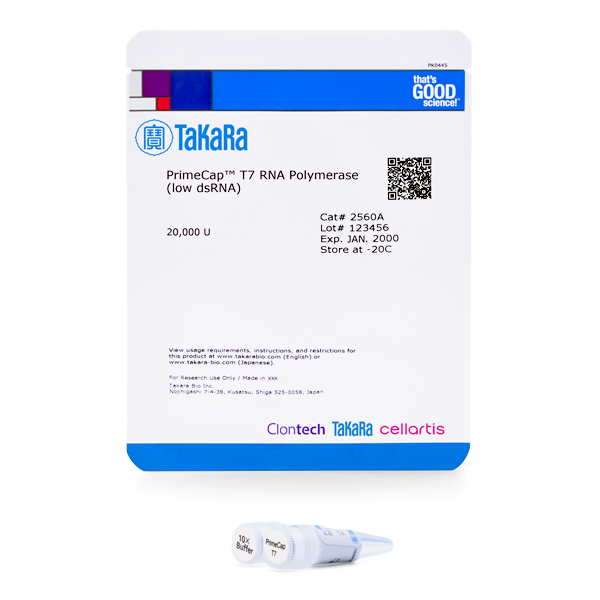Launch of high-quality mutant T7 RNA polymerase suitable for mRNA vaccine and therapeutic development
Takara Bio has released PrimeCap T7 RNA Polymerase (low dsRNA) (hereafter referred to as PrimeCap T7 RNA Polymerase), a mutant T7 RNA polymerase suitable for mRNA therapeutic research and development, in March 2024.
mRNA vaccines have been deployed effectively as a defense against the coronavirus, with ongoing research extending beyond infectious disease prevention to encompass therapeutic applications like cancer treatment.
Typically, mRNA utilized in vaccines and therapeutics is synthesized enzymatically using RNA polymerase within a controlled, artificial setting—a process known as in vitro transcription. Alongside the intended single-stranded RNA, artificially synthesized mRNA often contains double-stranded RNA (dsRNA), which potentially triggers an unwanted immune response. Therefore, minimizing the generation of dsRNA is necessary to ensure the safety and efficacy of mRNA vaccines and therapeutics.
PrimeCap T7 RNA Polymerase was generated through genetic engineering to alter the wild-type T7 RNA polymerase and subsequently optimizing reaction conditions to reduce dsRNA production to less than 10% while maintaining high-performance RNA synthesis activity (Table 1).
Furthermore, for in vitro-transcribed mRNA to be translated into functional proteins within a living organism, it must possess a cap structure at the 5′ end. One challenge lies in increasing the capping efficiency. Based on the results of collaborative research on machine learning with Professor Tsuyoshi Shirai, Department of Bioscience, Nagahama Institute of Bioscience and Technology, we have enhanced, through genetic modification, the polymerase activity of cap-structure addition.
Through the integration of PrimeCap T7 RNA Polymerase with our supplementary enzyme reagents* (see Related products) and a cap analog,† we can now effectively produce high-quality mRNA with a cap structure while minimizing the presence of dsRNA impurities.
Takara Bio is expanding its range of GMP-grade enzymes for mRNA synthesis, including PrimeCap T7 RNA Polymerase. As a CDMO, Takara Bio offers comprehensive services for mRNA vaccine development, manufacturing, and quality testing, supporting the widespread adoption of mRNA vaccines.
| Table 1. Comparison of RNA yield and dsRNA amount. | ||
|---|---|---|
| mRNA yield (μg/20 μl reaction system) | dsRNA amount (relative ratio with a wild-type T7 RNA Polymerase ver2.0 as 100) | |
| PrimeCap T7 RNA Polymerase (low dsRNA) | 168 | 4% |
| T7 RNA Polymerase ver2.0 | 163 | 100% |
In addition to PrimeCap T7 RNA Polymerase, we recommend adding Pyrophosphatase (inorganic) (Cat. # 2450A) and Recombinant RNase Inhibitor ver.2.0 (Cat. # 2315A) to the in vitro transcription reaction to maximize RNA yields.
This reagent does not contain cap analogs. Please purchase TriLink’s CleanCap Reagent AG separately.
| Product | Cat. # | Size |
|---|---|---|
| PrimeCap T7 RNA Polymerase (low dsRNA) | 2560A | 20,000 U |
Related products
| Product | Cat. # | Size |
|---|---|---|
| RUO | ||
| T7 RNA Polymerase ver.2.0 | 2541A | 20,000 U |
| Pyrophosphatase (inorganic) | 2450A/B | 10/50 U |
| Vaccinia Capping Enzyme | 2460A/B | 500/2,000 U |
| mRNA Cap 2′-O-Methyltransferase | 2470A/B | 2,500/10,000 U |
| Recombinant RNase Inhibitor ver.2.0 | 2315A/B | 5,000/25,000 U |
| BspQI | 1227A/B | 500/2,500 U |
| HQ | ||
| T7 RNA Polymerase, HQ | 2542A | 200,000 U |
| Pyrophosphatase (inorganic), HQ | 2451A | 1,000 U |



